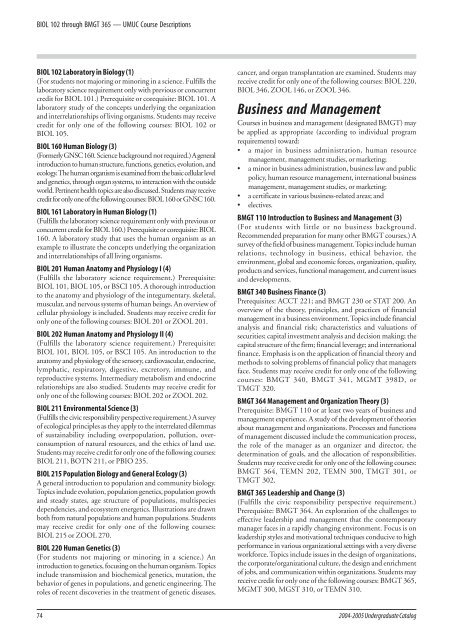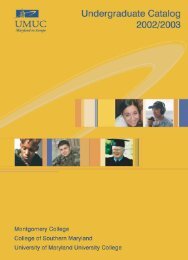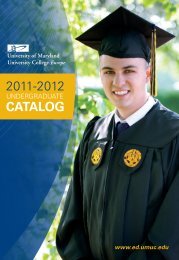Statements of Policy - UMUC Europe
Statements of Policy - UMUC Europe
Statements of Policy - UMUC Europe
Create successful ePaper yourself
Turn your PDF publications into a flip-book with our unique Google optimized e-Paper software.
BIOL 102 through BMGT 365 — <strong>UMUC</strong> Course Descriptions<br />
BIOL 102 Laboratory in Biology (1)<br />
(For students not majoring or minoring in a science. Fulfills the<br />
laboratory science requirement only with previous or concurrent<br />
credit for BIOL 101.) Prerequisite or corequisite: BIOL 101. A<br />
laboratory study <strong>of</strong> the concepts underlying the organization<br />
and interrelationships <strong>of</strong> living organisms. Students may receive<br />
credit for only one <strong>of</strong> the following courses: BIOL 102 or<br />
BIOL 105.<br />
BIOL 160 Human Biology (3)<br />
(Formerly GNSC 160. Science background not required.) A general<br />
introduction to human structure, functions, genetics, evolution, and<br />
ecology. The human organism is examined from the basic cellular level<br />
and genetics, through organ systems, to interaction with the outside<br />
world. Pertinent health topics are also discussed. Students may receive<br />
credit for only one <strong>of</strong> the following courses: BIOL 160 or GNSC 160.<br />
BIOL 161 Laboratory in Human Biology (1)<br />
(Fulfills the laboratory science requirement only with previous or<br />
concurrent credit for BIOL 160.) Prerequisite or corequisite: BIOL<br />
160. A laboratory study that uses the human organism as an<br />
example to illustrate the concepts underlying the organization<br />
and interrelationships <strong>of</strong> all living organisms.<br />
BIOL 201 Human Anatomy and Physiology I (4)<br />
(Fulfills the laboratory science requirement.) Prerequisite:<br />
BIOL 101, BIOL 105, or BSCI 105. A thorough introduction<br />
to the anatomy and physiology <strong>of</strong> the integumentary, skeletal,<br />
muscular, and nervous systems <strong>of</strong> human beings. An overview <strong>of</strong><br />
cellular physiology is included. Students may receive credit for<br />
only one <strong>of</strong> the following courses: BIOL 201 or ZOOL 201.<br />
BIOL 202 Human Anatomy and Physiology II (4)<br />
(Fulfills the laboratory science requirement.) Prerequisite:<br />
BIOL 101, BIOL 105, or BSCI 105. An introduction to the<br />
anatomy and physiology <strong>of</strong> the sensory, cardiovascular, endocrine,<br />
lymphatic, respiratory, digestive, excretory, immune, and<br />
reproductive systems. Intermediary metabolism and endocrine<br />
relationships are also studied. Students may receive credit for<br />
only one <strong>of</strong> the following courses: BIOL 202 or ZOOL 202.<br />
BIOL 211 Environmental Science (3)<br />
(Fulfills the civic responsibility perspective requirement.) A survey<br />
<strong>of</strong> ecological principles as they apply to the interrelated dilemmas<br />
<strong>of</strong> sustainability including overpopulation, pollution, overconsumption<br />
<strong>of</strong> natural resources, and the ethics <strong>of</strong> land use.<br />
Students may receive credit for only one <strong>of</strong> the following courses:<br />
BIOL 211, BOTN 211, or PBIO 235.<br />
BIOL 215 Population Biology and General Ecology (3)<br />
A general introduction to population and community biology.<br />
Topics include evolution, population genetics, population growth<br />
and steady states, age structure <strong>of</strong> populations, multispecies<br />
dependencies, and ecosystem energetics. Illustrations are drawn<br />
both from natural populations and human populations. Students<br />
may receive credit for only one <strong>of</strong> the following courses:<br />
BIOL 215 or ZOOL 270.<br />
BIOL 220 Human Genetics (3)<br />
(For students not majoring or minoring in a science.) An<br />
introduction to genetics, focusing on the human organism. Topics<br />
include transmission and biochemical genetics, mutation, the<br />
behavior <strong>of</strong> genes in populations, and genetic engineering. The<br />
roles <strong>of</strong> recent discoveries in the treatment <strong>of</strong> genetic diseases,<br />
74<br />
cancer, and organ transplantation are examined. Students may<br />
receive credit for only one <strong>of</strong> the following courses: BIOL 220,<br />
BIOL 346, ZOOL 146, or ZOOL 346.<br />
Business and Management<br />
Courses in business and management (designated BMGT) may<br />
be applied as appropriate (according to individual program<br />
requirements) toward:<br />
• a major in business administration, human resource<br />
management, management studies, or marketing;<br />
• a minor in business administration, business law and public<br />
policy, human resource management, international business<br />
management, management studies, or marketing;<br />
• a certificate in various business-related areas; and<br />
• electives.<br />
BMGT 110 Introduction to Business and Management (3)<br />
(For students with little or no business background.<br />
Recommended preparation for many other BMGT courses.) A<br />
survey <strong>of</strong> the field <strong>of</strong> business management. Topics include human<br />
relations, technology in business, ethical behavior, the<br />
environment, global and economic forces, organization, quality,<br />
products and services, functional management, and current issues<br />
and developments.<br />
BMGT 340 Business Finance (3)<br />
Prerequisites: ACCT 221; and BMGT 230 or STAT 200. An<br />
overview <strong>of</strong> the theory, principles, and practices <strong>of</strong> financial<br />
management in a business environment. Topics include financial<br />
analysis and financial risk; characteristics and valuations <strong>of</strong><br />
securities; capital investment analysis and decision making; the<br />
capital structure <strong>of</strong> the firm; financial leverage; and international<br />
finance. Emphasis is on the application <strong>of</strong> financial theory and<br />
methods to solving problems <strong>of</strong> financial policy that managers<br />
face. Students may receive credit for only one <strong>of</strong> the following<br />
courses: BMGT 340, BMGT 341, MGMT 398D, or<br />
TMGT 320.<br />
BMGT 364 Management and Organization Theory (3)<br />
Prerequisite: BMGT 110 or at least two years <strong>of</strong> business and<br />
management experience. A study <strong>of</strong> the development <strong>of</strong> theories<br />
about management and organizations. Processes and functions<br />
<strong>of</strong> management discussed include the communication process,<br />
the role <strong>of</strong> the manager as an organizer and director, the<br />
determination <strong>of</strong> goals, and the allocation <strong>of</strong> responsibilities.<br />
Students may receive credit for only one <strong>of</strong> the following courses:<br />
BMGT 364, TEMN 202, TEMN 300, TMGT 301, or<br />
TMGT 302.<br />
BMGT 365 Leadership and Change (3)<br />
(Fulfills the civic responsibility perspective requirement.)<br />
Prerequisite: BMGT 364. An exploration <strong>of</strong> the challenges to<br />
effective leadership and management that the contemporary<br />
manager faces in a rapidly changing environment. Focus is on<br />
leadership styles and motivational techniques conducive to high<br />
performance in various organizational settings with a very diverse<br />
workforce. Topics include issues in the design <strong>of</strong> organizations,<br />
the corporate/organizational culture, the design and enrichment<br />
<strong>of</strong> jobs, and communication within organizations. Students may<br />
receive credit for only one <strong>of</strong> the following courses: BMGT 365,<br />
MGMT 300, MGST 310, or TEMN 310.<br />
2004-2005 Undergraduate Catalog






